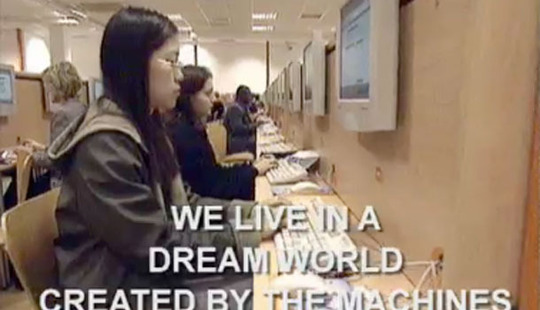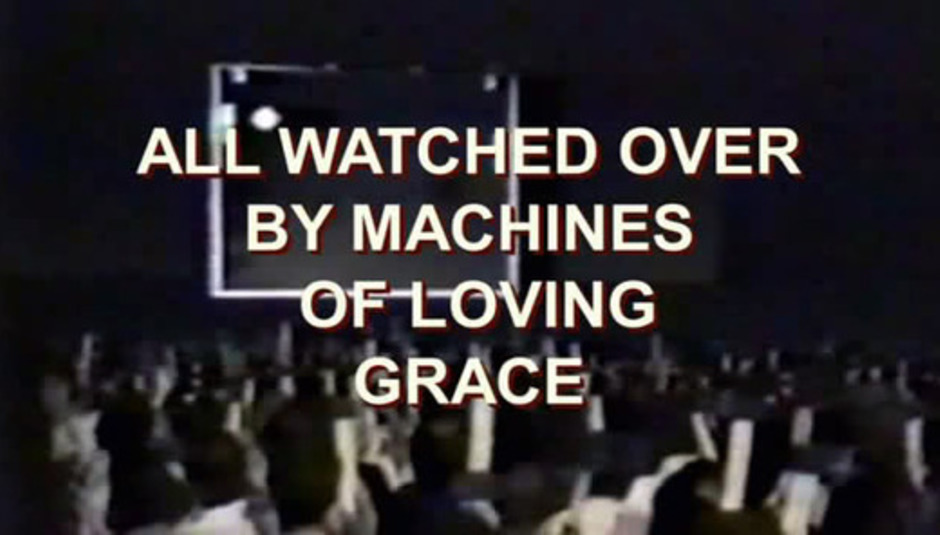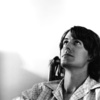DiS doesn't do awards but if we did, we'd be naming Adam Curtis documentary maker of the year (did you see some those threads about him on our social board this year?). We also really rather like throb-tronica duo Ghosting Season, who've played various DiS festival stages throughout this year. We also liked the idea of them doing some intereogation and transcription, so we we could put our feet up and watch Elf. Merry f'in DiSmas...
Hello.
I'm Gavin, and I play in the band Ghosting Season.
I don't really dabble in music journalism, so bear with me. In fact, the last time I attempted it was about 8 years ago for a local music website, where I wrote massively pretentious reviews of rubbish CDs and tried to shoehorn in as much overbearing language into gig write-ups as possible.
Anyway.
I guess that's kind of a fitting intro actually, because it was around that time (2004-ish) that Adam Curtis had one of his first pieces of documentary film televised on BBC2. It was called The Power of Nightmares, and dealt mainly with the rise of Neo-Conservatism in America, and the politics of fear. It had a pretty profound impact on me, as an idealistic twenty-something, still struggling to make sense of a lot of mad stuff happening in the world. The stark, sometimes distressing imagery, obscure electronic music, and detailed monologues by Curtis himself really resonated. Safe to say I'd never seen anything like it before.
He's since had two more documentaries broadcast by the Beeb - The Trap in 2007, which examined the concept of freedom, and the more recent All Watched Over By Machines Of Loving Grace, which went out earlier this year, and dealt with the idea of computers distorting the view of the world around us.
I guess there wasn't much of a reason for me to do this interview other than for my own curiosity, and the curiosity of a certain Matthew Britton (the chap behind The Pigeon Post blog). After All Watched Over... had finished its run, we both shared a love for the beautifully executed soundtrack, and went to extraordinary lengths to get information about it. In a surreal, sometimes bizarre mixture of styles, Curtis used Burial next to Nine Inch Nails, Clint Mansell's 'Moon' soundtrack next to Pizzicato Five's upbeat pop, all behind a collage of archive footage and interviews with economists.
We hatched a plan for Ghosting Season to interview Curtis about the use of music in his films, but it remained just an idea until last week, when I had a weird, chance dream involving Matthew and I discussing our plans again (and yes, I do know how pretentious that sounds). The next morning, I sent a few emails, and a week later, found myself on the other end of a phone line with Adam Curtis.

"It's the inner DJ in me coming out, in a sort of distorted way," he began, before adding that it is, as me and Matthew hoped, just himself who works on the music side of things. He's a music nerd, and one who takes great pleasure in playing around with different tunes.
"I am one of those people who will go up to a person behind a counter at a shop and ask what's playing... I'll pick up things from the internet, or I'll have friends who introduce me to stuff," he explains.
His speaking voice is, as you would expect, much the same as his narrating voice, so on more than one occasion, I keep thinking he's about to launch into a detailed description of the Middle Eastern finance system.
After talking with him for a while though, he gives a very simple answer to a question that perhaps I was reading too much into: he basically likes what he likes.
"There was a piece I used by that guy Burial recently, and to be honest, it's the only bit I like on that album. I really liked the romantic repetition of the mood, so I just remembered it. Then you try it out over something, and see if it works, but often it's almost by accident. You hear something, you keep it in your brain and you use it. It's never intentional at all, really."

His choices of music are always exquisitely picked, with vastly different songs blending into, or in some cases, overlapping one another, sourced from a variety of different places. That’s what's so great about an Adam Curtis documentary: the music selection doesn't make much sense on paper, but it makes perfect sense when you watch it.
So why just commercial tracks? Surely someone could do an amazing score to an Adam Curtis documentary, right? "No. It never worked, because what happens is the composer, however well intentioned they are, creates a sort of monoculture, a particular type of sound, that then pervades the whole movie - it limits it down to a world of the sound of that person."
One way he makes sure his soundtracks are unique is to pepper the audio mix with found sounds. "There are lots and lots of little noises in there too, which I find on the audio tracks of old archive video,” he expands. “I always watch for noise and sound, and mix those in, so you can get a real variety going. I feel you should always keep surprising people with the music you use. Basically,” he says with a muffled laugh, “I like pop music and odd noise."
He relates his use of layering music back to an epiphany he had whilst watching an opera by Shostakovich. "He has the orchestra playing one theme in the pit, and then onstage there's a brass band playing a completely opposing piece of music, both blasting out at exactly the same level. It was brilliant, and it worked. I thought, 'If he can do that in 1935, I can do that now.'"
Another key element to any Curtis documentary is the liberal use of old pop songs from the 1950s and ‘60s. When I was asking other Curtis enthusiasts if they had any for questions for him, people were fascinated by his love affair with these types of songs, which he often uses against pretty severe imagery. He explains:
"The great delight in pop music is that the people making it know full well what they're up to, and are much wiser and much cleverer than the dumb lyrics that they're doing. The audience they're going out to are also a lot cleverer than they are portrayed as being, so both sides are playing a very complicated game with each other. They're both communicating with each other in implicit ambiguous signals, in what appears to be dumb music.
"There's a song which I used in 'It Felt Like A Kiss' (an experimental mixed media piece Curtis made in 2009), called 'The End Of The World' by Skeeter Davis, and it's really knowing. It's really complex. I put it over a shot of an elderly couple trying to kiss, and failing, and obviously that's a really complex relationship, and suddenly the complexity of that song comes into focus, and you make it work. It's not trying to stand outside its time, its of its time."
It's at this point in the conversation, that I realize I could probably listen to him all day. His theories and stories are like brain food, so I let him continue pretty much uninterrupted.
I’ve been wanting to ask him one question all this time though – who does he admire in music at the moment? He answers almost immediately: Trent Reznor. "I think what's coming is a new romanticism, and he's found a way of doing that, literally through noise, which I just think is fantastic.
"He's really, really good at taking noise and lots of avant-garde stuff, and turning it into something epically romantic. It's really beautiful."
He tells me how he's also re-visiting some classical music, in particular Mahler. "Wouldn't it be really interesting if someone tried to combine that with noise?" he muses.
He also waxes lyrical about Kevin Martin's bass heavy project The Bug - "I like the romantic sparse stuff he does. Not the super-noisy ones." Then there's his "favourite clever-stupid pop band in the world", Stereo Total, who soundtracked the closing credits to his last series with their rebel rousing 'Aua'. In addition to all that, he mentions everything from American composer Charles Ives' work, Le Tigre, obscure musique concrète, Schneider TM's cover of The Smiths, and even Detroit Grand Pubahs. It's a very odd mix of music, but a thoroughly enjoyable one nonetheless.
He goes on to share a love of Ivo-Watts Russell's 4AD supergroup, This Mortal Coil, and in particular, the way two tracks, 'Fyt' and 'Fond Affections', from their debut album 'It'll All End In Tears', blend from an industrial noise piece into an incredibly romantic love song. Which sums up Adam Curtis rather nicely I think.
So that was that. After weird dreams, half thought out ideas, and staring at Word for a the best part of a week, it turned out to be a pretty fantastic interview, and I’m glad I decided to don my journo cap once again, if only for one feature. He’s a fascinating character, and if you haven’t experienced one of his audiovisual assaults, you can watch most of his documentaries online for free. I suggest starting with The Power of Nightmares and then exploring at your leisure.






















